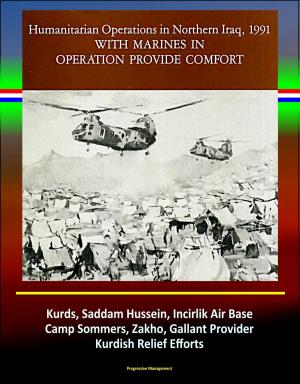Learning from Our Military History: The United States Army, Operation Iraqi Freedom, and the Potential for Operational Art and Thinking - Petraeus, COIN, Clausewitz, Counterinsurgency
Nonfiction, History, Military, Vietnam War, Asian| Author: | Progressive Management | ISBN: | 9781311405371 |
| Publisher: | Progressive Management | Publication: | October 26, 2014 |
| Imprint: | Smashwords Edition | Language: | English |
| Author: | Progressive Management |
| ISBN: | 9781311405371 |
| Publisher: | Progressive Management |
| Publication: | October 26, 2014 |
| Imprint: | Smashwords Edition |
| Language: | English |
How was the US Army successful in OIF? Some tactical organizations, companies included, learned and adapted, whereas others accomplished little and made the environment worse. The interviews conducted as part of the Scholar's Program and personal reflections confirmed that a deeper and more historical understanding is required. OIF demonstrated the need for operational art and thinking, particularly in commanders of relatively junior rank. After all the effort expended in Iraq, we may ultimately fail in crafting our own military history in OIF in breadth and depth. This thesis offers an explanation on how we learned and adapted in OIF, not for the purposes of a definitive military history, but only as an intellectual way point that may lead us to useful military history for the future of the Army.
Many of the current accounts of the Army's efforts in OIF rely on a baseline claim, at times assumed, on an historical argument roughly described as the rejection thesis. The rejection thesis has roots in the end of the Vietnam War, and its consequences extended into OIF. This thesis argues that Army deliberately rejected counterinsurgency, in theory and practice, following Vietnam. The moral arguments for rejection of counterinsurgency emanated from a visceral reaction to the war and the tremendous amount of resources devoted towards a losing effort. In the end, the Army bore the heaviest cost during the war as well as the brunt of the political and public opprobrium following its end. The Army barely escaped from the aftermath of Vietnam. Thus, equating counterinsurgency as Vietnam enabled the Army and its leaders to cast off COIN with the war itself, returning the thinking on war and warfare to its proper sphere, conventional land battle in Europe, where the true strategic interest lay.
CHAPTER 1 - INTRODUCTION * CHAPTER 2 - DOCTRINE, HISTORY, AND OPERATIONAL ART * The Necessity of Military History for Command Leadership * Contemporary Arguments Surrounding Counterinsurgency Doctrine * Is Doctrine Consequential? * The U.S. Army Experience in OIF * Clausewitz on Education and Developing Commanders * Rule Breakers: The Genius and the Talented * Divergent Philosophy on the Role of Doctrine: Generals DePuy and Cushman * CHAPTER 3 - OPERATIONAL ART IN COUNTERINSURGENCY * Operational Art in U.S. Army Doctrine and in COIN * General Sir Frank Kitson on Theory and Practice: A Synopsis * Kitson on Operational Art in COIN: The Four Requirements of a Campaign * Kitson on the Essential Capability in COIN, and War in General * Operational Art in Recent COIN History: A Black Hole * Methods and Tactics in Counterinsurgency * CHAPTER 4 - OPERATION IRAQI FREEDOM: A WAR OF MANAGEMENT * Operation Iraqi Freedom: A Synopsis * Preparing for Deployment: Taking Bureaucracy to War * The Surge in Context: Towards a Better Equilibrium * CHAPTER 5 - EDUCTION FROM DIRECT EXPERIENCE: GENERAL THOUGHTS ON LEARNING ORGANIZATIONS IN OIF * Command Leadership and Learning Organizations * Learning Organizations in OIF: Whither the Military Staff? * The Impulse to Learning, Adaptation, and Innovation * Command Leadership and Climate: The Keystone of the Learning Organization * Commander Traits and the Learning Organization * Learning in Action: One Common Thread * Mission Command in OIF or Simply an Environment of Autonomy? * Environmental Truths in OIF: Reconciling Inconsistency in Belief and Practice * Operationalizing the Learning Organization: Deviance and Innovation * The Fundamental Requirement for Tactical Organizations in COIN: Basic Fighting Competence * CHAPTER 6 - THE PROFESSION OF ARMS, MILITARY HISTORY, AND THE POTENTIAL FOR OPERATIONAL ART AND THINKING * On the Utility of Doctrine * COIN Doctrine and its Place * Overcoming Tradition and Culture Through Education * Education as the Means to Fix Military Culture * Conclusion: The Imperative of Operational Art and Thinking * FOOTNOTES * BIBLIOGRAPHY
How was the US Army successful in OIF? Some tactical organizations, companies included, learned and adapted, whereas others accomplished little and made the environment worse. The interviews conducted as part of the Scholar's Program and personal reflections confirmed that a deeper and more historical understanding is required. OIF demonstrated the need for operational art and thinking, particularly in commanders of relatively junior rank. After all the effort expended in Iraq, we may ultimately fail in crafting our own military history in OIF in breadth and depth. This thesis offers an explanation on how we learned and adapted in OIF, not for the purposes of a definitive military history, but only as an intellectual way point that may lead us to useful military history for the future of the Army.
Many of the current accounts of the Army's efforts in OIF rely on a baseline claim, at times assumed, on an historical argument roughly described as the rejection thesis. The rejection thesis has roots in the end of the Vietnam War, and its consequences extended into OIF. This thesis argues that Army deliberately rejected counterinsurgency, in theory and practice, following Vietnam. The moral arguments for rejection of counterinsurgency emanated from a visceral reaction to the war and the tremendous amount of resources devoted towards a losing effort. In the end, the Army bore the heaviest cost during the war as well as the brunt of the political and public opprobrium following its end. The Army barely escaped from the aftermath of Vietnam. Thus, equating counterinsurgency as Vietnam enabled the Army and its leaders to cast off COIN with the war itself, returning the thinking on war and warfare to its proper sphere, conventional land battle in Europe, where the true strategic interest lay.
CHAPTER 1 - INTRODUCTION * CHAPTER 2 - DOCTRINE, HISTORY, AND OPERATIONAL ART * The Necessity of Military History for Command Leadership * Contemporary Arguments Surrounding Counterinsurgency Doctrine * Is Doctrine Consequential? * The U.S. Army Experience in OIF * Clausewitz on Education and Developing Commanders * Rule Breakers: The Genius and the Talented * Divergent Philosophy on the Role of Doctrine: Generals DePuy and Cushman * CHAPTER 3 - OPERATIONAL ART IN COUNTERINSURGENCY * Operational Art in U.S. Army Doctrine and in COIN * General Sir Frank Kitson on Theory and Practice: A Synopsis * Kitson on Operational Art in COIN: The Four Requirements of a Campaign * Kitson on the Essential Capability in COIN, and War in General * Operational Art in Recent COIN History: A Black Hole * Methods and Tactics in Counterinsurgency * CHAPTER 4 - OPERATION IRAQI FREEDOM: A WAR OF MANAGEMENT * Operation Iraqi Freedom: A Synopsis * Preparing for Deployment: Taking Bureaucracy to War * The Surge in Context: Towards a Better Equilibrium * CHAPTER 5 - EDUCTION FROM DIRECT EXPERIENCE: GENERAL THOUGHTS ON LEARNING ORGANIZATIONS IN OIF * Command Leadership and Learning Organizations * Learning Organizations in OIF: Whither the Military Staff? * The Impulse to Learning, Adaptation, and Innovation * Command Leadership and Climate: The Keystone of the Learning Organization * Commander Traits and the Learning Organization * Learning in Action: One Common Thread * Mission Command in OIF or Simply an Environment of Autonomy? * Environmental Truths in OIF: Reconciling Inconsistency in Belief and Practice * Operationalizing the Learning Organization: Deviance and Innovation * The Fundamental Requirement for Tactical Organizations in COIN: Basic Fighting Competence * CHAPTER 6 - THE PROFESSION OF ARMS, MILITARY HISTORY, AND THE POTENTIAL FOR OPERATIONAL ART AND THINKING * On the Utility of Doctrine * COIN Doctrine and its Place * Overcoming Tradition and Culture Through Education * Education as the Means to Fix Military Culture * Conclusion: The Imperative of Operational Art and Thinking * FOOTNOTES * BIBLIOGRAPHY















